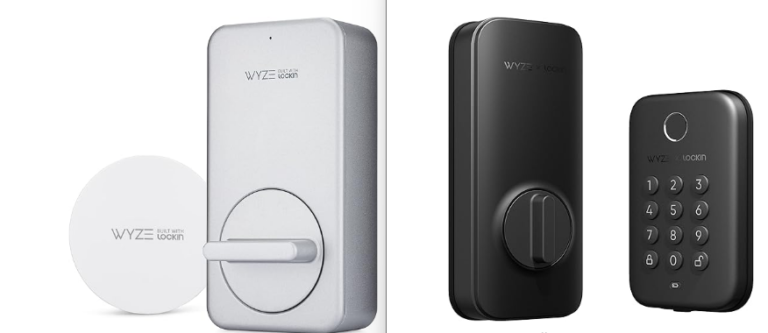A Guide to the Best Smart Door Locks
Smart door locks are rapidly becoming a cornerstone of modern home security and convenience. Gone are the days of fumbling for keys or worrying about getting locked out. With a smart lock, your fingerprint, smartphone, or even voice can be your key, granting you peace of mind and a touch of futuristic luxury.
This guide delves into the world of smart locks, exploring different types, features, popular brands, and addressing common concerns like security, battery life, and installation. By the end, you’ll be equipped to choose the perfect smart lock to upgrade your home security.
Table of Contents
ToggleTypes of Smart Door Locks
Smart locks come in various forms, each with its own advantages and considerations:
Fingerprint Smart Locks
These locks offer a secure and convenient way to unlock your door with a simple touch. Fingerprint readers are typically very accurate and can store fingerprints for multiple users.
Pros: Convenient, highly secure, eliminates the need to carry keys.
Cons: Fingerprint readers can malfunction due to weather or dirty fingers. May not be suitable for large families with frequent users.
Wi-Fi Smart Locks
These locks connect to your home’s Wi-Fi network, allowing you to lock or unlock your door remotely from your smartphone using a dedicated app. They often come with additional features like activity logs and lock history.
Pros: Remote access, easy to integrate with smart home systems.
Cons: Requires a strong Wi-Fi signal, may be vulnerable to hacking if not properly secured.
Bluetooth Smart Locks
Bluetooth smart locks connect to your phone via Bluetooth, enabling you to unlock the door from within a certain range. While not offering remote access like Wi-Fi locks, they are often more affordable and battery-efficient.
Pros: Typically affordable, easy to install.
Cons: Limited range, requires your smartphone to be nearby for unlocking.
Keypad Smart Locks
These locks feature a keypad where you can enter a PIN code to unlock the door. They are a good option for those who want a physical backup to keyless entry or for granting access to temporary guests.
Pros: Offer an alternative unlocking method besides a smartphone, ideal for granting access to housekeepers or dog walkers.
Cons: Codes can be shared or stolen, less convenient than fingerprint or smartphone unlocking.
Popular Smart Lock Brands
The smart lock market is brimming with innovative brands, each offering a range of features and functionalities. Here are some of the most popular choices:

Yale Yale smart locks is a trusted name in home security, offering a comprehensive line of smart locks with features like fingerprint recognition, Wi-Fi connectivity, and voice assistant integration.

Philips Philips Smart locks offers a range of smart locks that integrate seamlessly with their Philips Hue smart home system. This allows you to create automated routines, such as unlocking the door when you turn on the lights upon arrival.

Wyze Wyze smart locks is a budget-friendly brand known for its feature-packed smart home products. Their Wyze Lock Bolt offers fingerprint unlocking, keypad access, and smartphone control at a very attractive price point.

Eufy Security Eufy Security smart locks is another popular brand offering a variety of smart lock options, including fingerprint sensor models and keypad locks. Eufy is known for its focus on user privacy and data security.
Factors to Consider When Choosing a Smart Lock
Here are some key factors to consider when selecting a smart lock for your home:
- Security: This is paramount. Choose a well-established brand with a good reputation for security. Look for features like strong encryption protocols and tamper detection.
- Features: Consider the features that are most important to you. Do you want fingerprint recognition, Wi-Fi connectivity, or voice assistant integration? Some locks even come with built-in cameras.
- Compatibility: Ensure the smart lock you choose is compatible with your door type and existing deadbolt. Some locks require a separate hub for remote functionality.
- Budget: Smart locks range in price from under $100 to over $300. Consider the features and brand reputation when evaluating the cost.
- Remote Locking and Unlocking: Grant or deny access from anywhere with an internet connection (Wi-Fi models).
- Guest Access: Create temporary codes or e-keys for housekeepers, dog walkers, or expected visitors.
- Activity Logs: Track who entered and exited your home, along with timestamps.
- Smart Home Integration: Connect your smart lock to other smart home devices for automated actions, such as turning on lights when you unlock the door.
- Voice Assistant Compatibility: Control your lock with voice commands using Google.
Common Smart Lock Concerns Answered
Here are answers to some of the most frequently asked questions regarding smart locks:
Price: How much does a smart lock cost?
A smart lock can cost anywhere from $65 to $350 or more. Generally, Wi-Fi enabled and fingerprint smart locks are on the higher end, while Bluetooth and keypad locks tend to be more affordable.
Security: Are smart locks really secure?
Smart locks can be just as secure, if not more secure, than traditional locks. Look for models with strong encryption protocols, tamper detection features, and a good reputation from established brands.
Battery life: How long does the battery on a smart lock last?
Battery life varies depending on usage and the specific lock model. Most smart locks last anywhere from 6 months to a year on a single charge. They typically send alerts when battery levels are low.